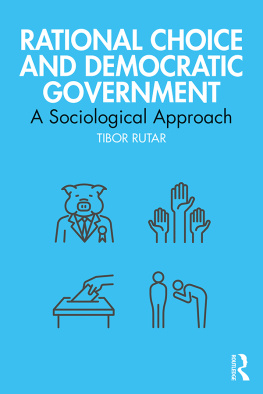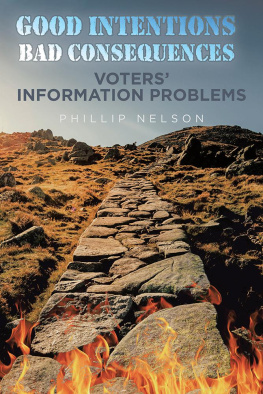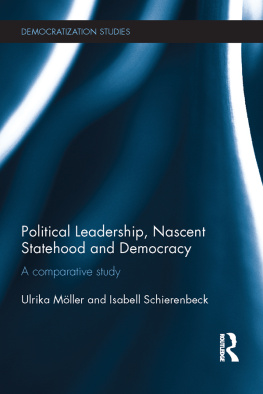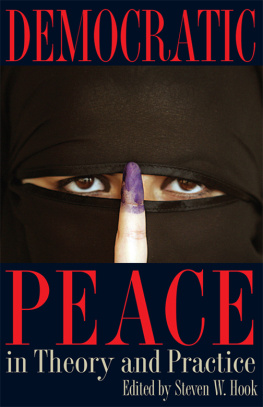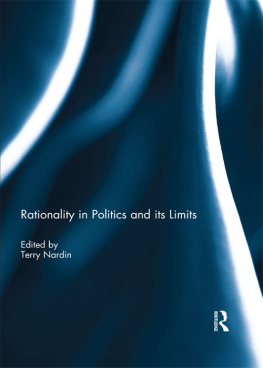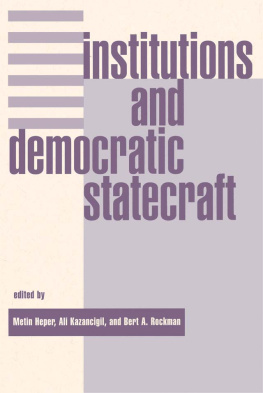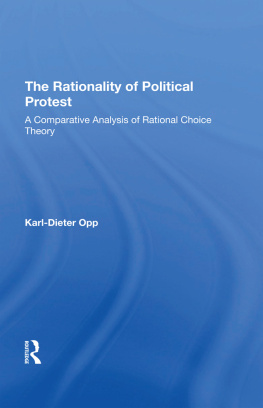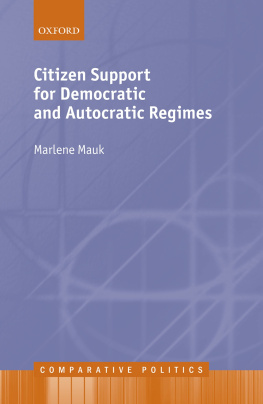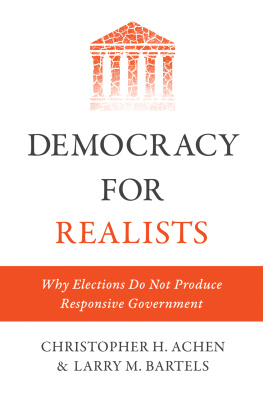Rational Choice and Democratic Government
Drawing on a range of data from across disciplines, this book explores a series of fundamental questions surrounding the nature, working and effects of democracy, considering the reasons for the emergence and spread of democratic government, the conditions under which it endures or collapses and the role of wealth in this process and the peaceful nature of dealings between democracies. With emphasis on the ordinary voter, the author employs rational choice theory to examine the motivations of voters and their levels of political knowledge and rationality, as well as the special interests, incentives and corruption of politicians. A theoretically informed and empirically illustrated study of the birth and downfall of democracies, the extent of voters political knowledge and ignorance, the logic of political behaviour in both open and closed regimes, and the international effects of democratic rule, Rational Choice and Democratic Government: A Sociological Approach will appeal to scholars with interests in political sociology, political psychology, economics and political science.
Tibor Rutar is Assistant Professor in the Department of Sociology at the University of Maribor, Slovenia.
ROUTLEDGE STUDIES IN POLITICAL SOCIOLOGY
Brains, Media and Politics
Generating Neoliberal Subjects
Rodolfo Leyva
The New Demagogues
Religion, Masculinity and the Populist Epoch
Joshua Roose
The Political Attitudes of Divided European Citizens
Public Opinion and Social Inequalities in Comparative and Relational Perspective
Christian Lahusen
The Contentious Politics of Expertise
Experts, Activism and Grassroots Environmentalism
Riccardo Emilio Chesta
Comparing and Contrasting the Impact of the COVID-19 Pandemic in the European Union
Linda Hantrais and Marie-Thrse Letablier
Masochistic Nationalism
Multicultural Self-Hatred and the Infatuation with the Exotic
Goran Adamson
Rational Choice and Democratic Government
A Sociological Approach
Tibor Rutar
For more information about this series, please visit: visit: https://www.routledge.com/sociology/series/RSPS
First published 2022
by Routledge
2 Park Square, Milton Park, Abingdon, Oxon OX14 4RN
and by Routledge
605 Third Avenue, New York, NY 10158
Routledge is an imprint of the Taylor & Francis Group, an informa business
2022 Tibor Rutar
The right of Tibor Rutar to be identified as author of this work has been asserted by him in accordance with sections 77 and 78 of the Copyright, Designs and Patents Act 1988.
All rights reserved. No part of this book may be reprinted or reproduced or utilised in any form or by any electronic, mechanical, or other means, now known or hereafter invented, including photocopying and recording, or in any information storage or retrieval system, without permission in writing from the publishers.
Trademark notice: Product or corporate names may be trademarks or registered trademarks, and are used only for identification and explanation without intent to infringe.
British Library Cataloguing-in-Publication Data
A catalogue record for this book is available from the British Library
Library of Congress Cataloging-in-Publication Data
Names: Rutar, Tibor, 1989- author. Title: Rational choice and democratic government : a sociological approach / Tibor Rutar. Description: Milton Park, Abingdon, Oxon ; New York, NY : Routledge, 2021. | Includes bibliographical references and index. Identifiers: LCCN 2021013575 (print) | LCCN 2021013576 (ebook) | ISBN 9781032000657 (hardback) | ISBN 9781032000688 (paperback) | ISBN 9781003172574 (ebook) Subjects: LCSH: Democracy--Social aspects. Classification: LCC JC423 .R88 2021 (print) | LCC JC423 (ebook) | DDC 306.2--dc23
LC record available at https://lccn.loc.gov/2021013575
LC ebook record available at https://lccn.loc.gov/2021013576
ISBN: 978-1-032-00065-7 (hbk)
DDC 306.2--dc23
ISBN: 978-1-032-00068-8 (pbk)
ISBN: 978-1-003-17257-4 (ebk)
DOI: 10.4324/9781003172574
DOI: 10.4324/9781003172574-1
Introduction: the historical peculiarity of mass democracy
Life in a stable, cushy liberal democracy is taken more or less for granted by many people in the West. Not only that, we tend to assume without questioning the moral superiority of democracy over other political regimes.
Our obliviousness to how weird and uncommon democracy in general, and liberal democracy in particular, has actually been in human civilization is in one sense not very surprising, as most Western countries have simply not experienced any other form of government in decades. Multiple generations have grown up in consolidated democracies. Likewise, the moral status we ascribe to this system is, on the face of it, quite deserved. Liberal democracies provide the most expansive and robust political and civil rights in the world. The former include such seemingly obvious amenities as free and fair elections, the right to assembly, and a realistic chance of opposition winning in electoral competitions. The latter encompass fundamental rights of free and independent media, of freely practising ones religion (or nonreligious beliefs), of free expression in general, the rule of law, and so on. However, when stepping back a bit and taking a more historical perspective, we immediately and quite painfully come to recognize that none of this is as obvious, self-evident, or secure as it might at first seem.
The first observation about the obviousness of democracy is, as I have already intimated, the quickest to collapse. Even though it is true that today many parts of the world (not relegated solely to the West) are filled almost to the brim with democracies, these regimes nevertheless represent less than 50% of all countries and less than 40% of the worlds population. Most people, even today, still live in non-liberal and simply non-democratic, i.e. autocratic, regimes. Furthermore, mass democracy appears as an even scarcer and more fragile phenomenon if we look back in time. Since the emergence of first pockets of human civilization around 5,000 years ago and right up until the late 19th century, illiberal autocracy was practically the only ubiquitous way in which states were governed. So, both spatially and temporally liberal democracy is the opposite of being obvious or given. It is a great, massive exception.
Of course, the fact that until very recently almost all states were authoritarian does not mean that all societies for the past few thousand years had also suffered the same fate. There existed quite a few early democracies, as David Stasavage has called them. These were almost without exception relegated to small-scale tribal societies, such as the Iroquois and Huron Indians, or the Germanic tribes in Europe. Moreover, they were very different from the more familiar mass representative, rights-protected democratic regimes of the modern era. To take just one important difference, there were no formal elections of leaders and universal adult suffrage was absent. What usually happened is that the leaders had to consult with, and thus yield some decision-making power to, local councils or assemblies. Even the most well-known case of early democracy, that of Ancient Athens, which was truly exceptional in the extent to which power was shared with, and ordinary people participated in, the assemblies, nevertheless remained small-scale compared to neighbouring regions. We should also not forget that it was not even a question whether women and slaves could enjoy the same civil and political right that men did.

